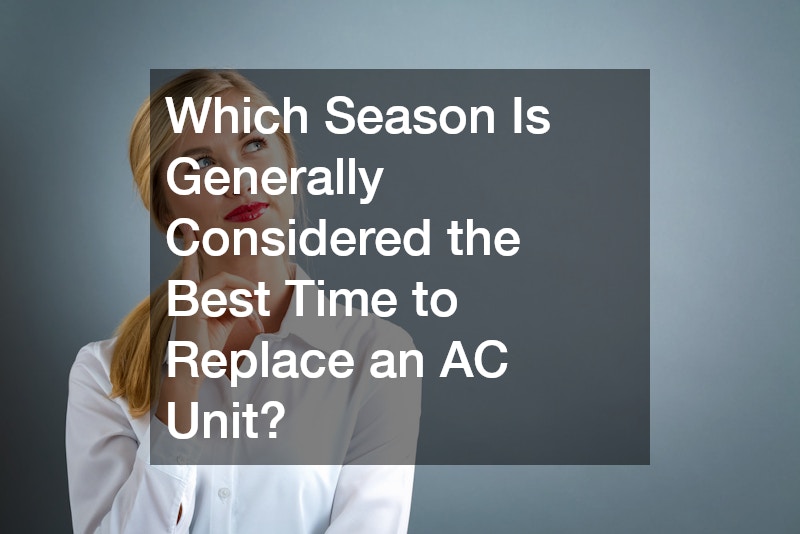Replacing an air conditioning unit is not just a matter of convenience—it is an investment in your home’s comfort, efficiency, and overall value. Knowing the right time to upgrade your system can save you money, reduce stress, and improve indoor air quality. While many homeowners wait until their system completely fails, a proactive approach ensures better energy savings and smoother scheduling with HVAC companies. With the right timing, services such as ac install, duct cleaning services, and even spray foam insulation service can be coordinated to optimize comfort and efficiency. This guide explores the signs, seasons, and factors that influence the decision to replace an air conditioning unit, along with the long-term benefits of careful planning.
How Do I Know It’s Time to Replace My AC Unit?
Signs of Wear and Tear
Over time, central air conditioning systems experience inevitable wear. Components such as motors, compressors, and fans lose efficiency, and even regular maintenance cannot fully restore their original performance. While hvac repair service providers can often extend the life of your system, visible deterioration like rust, frayed wiring, or damaged coils suggests it may be time for a replacement rather than continued patchwork fixes.
Decreased Efficiency
If your air conditioning unit no longer cools your home as effectively as it once did, it is often due to reduced efficiency. Older models cannot compete with modern energy standards, even with professional duct cleaning services or routine filter replacements. Rising utility bills paired with diminished performance serve as warning signs that your system is costing more than it should.
Increasing Repair Costs
Frequent service calls for air conditioner repair services can add up quickly. A unit that breaks down every season is not just inconvenient—it is financially unsustainable. Many homeowners reach a tipping point when repair expenses begin rivaling the cost of a new system, making replacement the smarter option.
Frequency of Breakdowns
Consistent breakdowns during the hottest or coldest months highlight a system struggling to keep up with demand. An unreliable system can place undue stress on your household, especially when waiting for an available electrical technician or HVAC contractor during peak service times.
Age of the AC Unit
Most central air conditioning systems last between 12 and 15 years. Even with diligent upkeep from licensed electricians or HVAC specialists, an older system will eventually become less reliable. Age alone, combined with declining performance, often signals the right time to invest in a new unit.
What Are the Benefits of Replacing an AC Unit During the Off-Season?
Cost Savings
The off-season—typically spring or fall—offers opportunities for significant cost savings. With lower demand, HVAC companies may provide better pricing for ac install projects. Replacing your system before peak summer or winter also reduces the likelihood of emergency repair costs.
Availability of Contractors
During off-peak months, you can secure appointments with licensed electricians and HVAC contractors more easily. Instead of scrambling during extreme weather when service providers are overwhelmed, scheduling in advance ensures a smoother experience.
Less Urgency
Without the pressure of sweltering heat or frigid temperatures, you have time to research equipment, compare models, and choose the best system for your home. The lack of urgency also allows for additional upgrades, such as spray foam insulation service, which enhances the performance of your new AC.
Scheduling Flexibility
Homeowners often find that contractors have more flexible schedules in the spring or fall. Whether you need drain cleaning alongside HVAC work or a consultation with an electrical technician, coordinating multiple services is easier outside the busiest months.
Potential Discounts
Many manufacturers and HVAC companies offer seasonal promotions. Off-season rebates, combined with incentives for energy-efficient systems, can significantly reduce the upfront cost of a new unit.
Which Season Is Generally Considered the Best Time to Replace an AC Unit?

Spring Advantages
Spring is widely seen as an ideal time for ac install. The mild weather reduces reliance on cooling, giving you a comfortable window to complete installation without disrupting your home’s climate. Contractors are also more available, and manufacturers often roll out promotions before summer demand surges.
Fall Pros and Cons
Fall offers similar advantages, with contractors less burdened by emergencies. However, waiting until fall could leave you vulnerable if your unit fails during the summer heat, making spring the more proactive choice.
Summer Challenges
Summer is the busiest season for air conditioner repair services. With demand at its highest, scheduling is more difficult, and costs may rise. If your unit fails during a heatwave, you may face delays that compromise comfort and safety.
Winter Considerations
In colder regions, replacing central air conditioning systems during winter can be impractical, especially if units are installed outdoors. Frozen conditions complicate installation, though winter may still offer contractor availability in warmer climates.
Climate-Specific Recommendations
Local climate plays a major role in timing. In humid regions, coordinating AC replacement with duct cleaning services helps prevent mold and improves air quality. In dry climates, spring installations prepare your home for the hottest months without interruption.
What Factors Should I Consider When Deciding to Replace My AC Unit?

Energy Efficiency Ratings
A modern system with a higher SEER rating delivers improved performance and reduced energy consumption. Many HVAC companies encourage homeowners to invest in efficient systems to lower long-term operating costs.
Unit Size and Capacity
Choosing the right size system is critical. An oversized unit short cycles, while an undersized one strains to keep up with demand. Professional consultation ensures accurate load calculations for your home.
Technology Upgrades
Today’s AC units come equipped with smart thermostats, advanced filtration, and remote monitoring features. When replacing your system, you have the opportunity to take advantage of these innovations for improved convenience.
Environmental Impact
Newer units consume less energy, reducing your carbon footprint. Combined with spray foam insulation service, energy-efficient AC systems create an environmentally responsible home environment.
Budget Considerations
Although upfront costs can feel daunting, long-term savings from lower energy bills and reduced repairs often justify the investment. Financing options from HVAC companies also make replacement more accessible.
Can Replacing an AC Unit Save Money on Energy Bills?

Improved Efficiency
Older systems require more energy to achieve the same level of cooling. A new unit designed with modern technology significantly reduces monthly costs while providing consistent comfort.
Long-term Savings
Over the lifespan of the unit, homeowners typically save thousands of dollars in energy expenses. Pairing AC replacement with duct cleaning services or insulation upgrades amplifies these savings.
Rebates and Incentives
Government programs and manufacturer rebates encourage homeowners to install energy-efficient systems. Incentives can offset installation expenses and accelerate your return on investment.
Modern Technological Features
Smart thermostats and eco-friendly cooling modes make new systems more efficient. Features such as zone control and variable-speed compressors prevent wasted energy.
Maintenance Cost Reduction
New systems require fewer repairs, lowering overall maintenance costs. While occasional hvac repair service may be necessary, the frequency is far less compared to older systems nearing the end of their lifespan.
How Does the Age of the AC Unit Affect Replacement Decisions?
Expected Lifespan
Central air conditioning units generally last 12 to 15 years. Beyond this point, even high-quality systems experience a sharp decline in efficiency and reliability.
Technological Advancements Over Time
Systems installed a decade ago cannot match the performance of modern designs. Innovations like improved refrigerants, smart sensors, and eco-friendly compressors make replacement appealing.
Manufacturer’s Warranty
New units often come with robust warranties that cover parts and labor for several years. In contrast, older systems may no longer qualify for coverage, leaving homeowners vulnerable to expensive repairs.
Frequency of Required Maintenance
As units age, air conditioner repair services become more frequent. Worn components break down more easily, and scheduled maintenance visits may not prevent unexpected issues.
Performance Degradation
Declining airflow, uneven cooling, and louder operation are all signs of a system past its prime. When even licensed electricians or skilled HVAC contractors cannot restore performance, replacement becomes inevitable.
What Are the Differences Between Repair and Replacement Costs?
Cost Comparison
While individual repairs may seem inexpensive, the cumulative cost over several years often rivals or exceeds replacement. Investing in a new system eliminates the recurring expense of patchwork fixes.
Long-term Value
Replacement offers better long-term value by delivering efficiency, reliability, and peace of mind. Unlike short-term repairs, a new unit represents an investment in comfort.
Frequency of Repairs
If your system requires hvac repair service multiple times per year, replacement becomes the more practical solution. Continuous breakdowns add up quickly, both financially and emotionally.
Emergency vs Planned Replacement
Emergency replacements are stressful and expensive. Planned replacements during off-peak seasons allow homeowners to budget effectively and secure better deals from HVAC companies.
Quality and Longevity
A properly installed system with regular maintenance can last over a decade, far outpacing the short-lived relief repairs provide. Partnering with a skilled electrical technician ensures installation quality.
How Does New Technology in AC Units Affect Replacement Timing?

Smart Features
Wi-Fi-enabled thermostats and system monitoring apps give homeowners unprecedented control. Features like scheduling, geofencing, and energy reporting maximize comfort and savings.
Eco-Friendly Options
Modern systems use refrigerants with lower environmental impact. Combined with energy-efficient designs, these innovations help reduce household carbon footprints.
Noise Reduction
Today’s units operate far more quietly than older systems. Improved fan blades, insulated compressors, and variable-speed motors all contribute to a quieter living environment.
Advanced Temperature Controls
Modern units provide precise temperature control, eliminating hot and cold spots. Zone control options ensure that every room in your home is comfortable.
Remote Monitoring and Control
With remote monitoring, both homeowners and HVAC companies can detect performance issues before they become emergencies. This proactive approach reduces downtime and costly repairs.
Should Weather Conditions Influence My Decision to Replace an AC Unit?
Hot Weather Considerations
Replacing an AC unit during a heatwave can be uncomfortable and expensive. Planning ahead ensures your system is ready before demand spikes.
Cold Season Scheduling
In colder regions, installation during winter can be challenging due to frozen ground and weather constraints. However, in milder areas, winter installations are still practical.
Humid Climates
High humidity accelerates wear on ductwork and insulation. Coordinating AC replacement with duct cleaning services improves airflow and reduces mold risks.
Storm and Weather Preparedness
Severe weather events can damage outdated systems. Installing a new unit in advance prepares your home for extreme conditions and reduces emergency repair needs.
Cooling Demand Changes
Climate change has altered temperature patterns in many regions. Rising summer temperatures mean your cooling demand may be higher now than when your old system was first installed.
What Role Do Energy Efficiency Ratings Play in Replacement?
Understanding SEER Ratings
Seasonal Energy Efficiency Ratio (SEER) ratings measure a system’s cooling output relative to energy consumption. Higher SEER ratings translate into better performance and lower energy bills.
Comparing Old and New Units
New systems often double the efficiency of units installed a decade ago. Upgrading offers immediate improvements in both cost savings and comfort.
Potential Savings
Energy-efficient systems reduce monthly expenses significantly. Over time, homeowners often recover the full cost of replacement through savings alone.
Environmental Impact of High-Efficiency Units
Efficient units consume less electricity, reducing reliance on power plants and lowering greenhouse gas emissions. Pairing with spray foam insulation service further enhances these benefits.
Government and Manufacturer Programs
Federal, state, and manufacturer programs frequently incentivize efficiency upgrades. Rebates and tax credits help offset the upfront investment in new systems, making replacement more affordable while encouraging homeowners to adopt sustainable, energy-efficient technologies.
The decision to replace your air conditioning unit should be guided by signs of wear, system age, and seasonal timing, as identifying the best time to replace ac unit can significantly impact overall savings and comfort. Proactive replacement during off-seasons offers cost savings, contractor availability, and opportunities to coordinate with services such as duct cleaning services, drain cleaning, and spray foam insulation service. By considering efficiency ratings, new technology, and long-term financial value, homeowners can determine the best time to replace ac unit and make informed choices that improve comfort and reduce costs. Working with trusted HVAC companies, licensed electricians, and an experienced electrical technician ensures a smooth ac install process. Ultimately, understanding the best time to replace ac unit and planning your replacement strategically results in greater energy savings, fewer breakdowns, and a more comfortable home environment for years to come.



